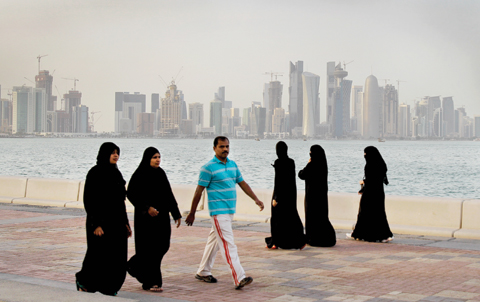'Business as usual' for Qatar's $300bn sovereign fund: CEO
DUBAI: A boycott of Qatar by a Saudi-led bloc of Arab states is hurting the economies of all the countries involved, with Bahrain and Qatar the most affected, Moody's Investor Service said yesterday. The row has translated into a credit negative for the entire six-nation Gulf Cooperation Council (GCC) - Saudi Arabia, the United Arab Emirates, Bahrain, Kuwait, Oman and Qatar, Moody's said in a report.
Saudi Arabia, the United Arab Emirates, Bahrain and Egypt on June 5 severed diplomatic ties and imposed economic sanctions on Qatar, accusing it of backing radical Islamist groups. Doha has denied the charges. "The severity of the diplomatic dispute between Gulf countries is unprecedented, which magnifies the uncertainty over the ultimate economic, fiscal and social impact on the GCC as a whole," said Steffen Dyck, Moody's vice president.
Qatar faces large economic, financial and social costs stemming from related travel and trade restrictions, it said. The impact on Qatar so far has been most acute for trade, tourism and the banking sector. Sizeable capital outflows in the vicinity of $30 billion flowed out of Qatar's banking system in June and July, with further declines expected as GCC banks opt not to roll over their deposits, Moody's said.
It estimates that Qatar used $38.5 billion-equivalent to 23 percent of its GDP-to support the economy in the first two months of sanctions. Moody's said it does not expect that Qatar will have to borrow from the international capital market this year, but its financing costs will increase. The standoff could also impair the sustainability of Bahrain's currency peg to the US dollar and will also increase the cost of borrowing for the kingdom, the poorest of the six oil-rich GCC nations. The diplomatic rift will inevitably impair the functioning of the GCC more severely as the row prolongs.
Meanwhile, the head of the Qatar Investment Authority said yesterday that the lingering Gulf political crisis was having little impact on the $300 billion sovereign wealth fund of the gas-rich nation. In a rare public appearance, Sheikh Abdullah Bin Mohamed Bin Saud Al-Thani, chief executive at the QIA, said there was "no problem" for the fund despite the crisis passing the 100-day mark.
"We are still open for business and business as usual," Sheikh Abdullah said in an address at the Carnegie Mellon University in Qatar. "We are fine," he added. Qatar has found itself regionally isolated since June 5. Pressed on the impact of the crisis several times, Sheikh Abdullah said the QIA's exposure to those countries leading the boycott was "very, very small" and added that the fund would continue its recent policy of targeting hi-tech and infrastructure companies in the United States.
"The future is technology," he said. Among the companies in which the QIA was investing were those in the health sector using hi-tech solutions for cancer treatment, said Sheikh Abdullah. In 2015 he announced that the QIA would invest up to $35 billion in the United States over the following five years, after targeting high-profile acquisitions in Europe. Last December it was also announced the fund would invest $10 billion in US infrastructure projects.
He said yesterday that around half of that $45 billion had been invested. The QIA has opened an office in New York and will do so soon in the Silicon Valley, he added. "If you want to invest in the States, you have to have boots on the ground," he said. Earlier this week it was announced that the QIA and Swiss commodities trader Glencore had sold a major part of a stake they had only recently acquired in Russian oil giant Rosneft to Chinese conglomerate CEFC. The QIA is considered one of the world's biggest sovereign funds, swollen by Qatar's massive gas and oil revenues. - Agencies











